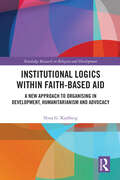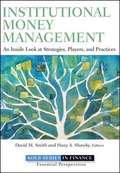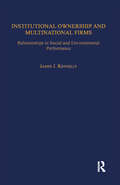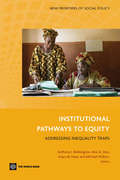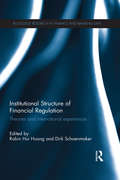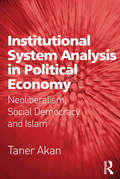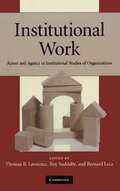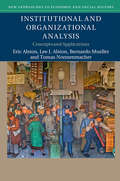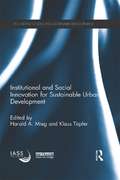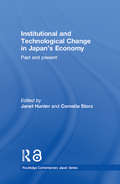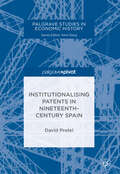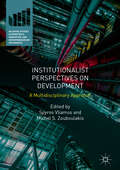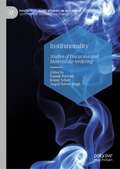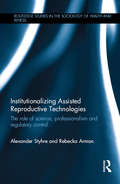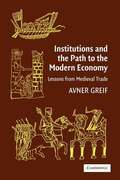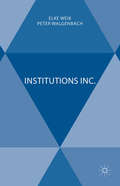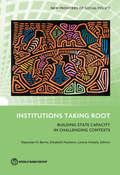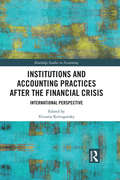- Table View
- List View
Institutional Logics within Faith-Based Aid: A New Approach to Organising in Development, Humanitarianism and Advocacy (Routledge Research in Religion and Development)
by Nina G. KurlbergThis book investigates what faith means in the actual day-to-day practice of faith-based NGOs working in the development, humanitarian, and advocacy sectors.Faith-based organisations play an extremely prominent role in international aid and development, operating within the same sphere as organisations without an explicit religious affiliation. This book uses the case study of a UK-based Christian faith-based organisation to develop an analytic tool using institutional logics. Through exploration of how various institutional logics are manifested and negotiated across organisational practice, the book describes how the ‘telos,’ or objective, of the corporate logic (to sustain the organisation) interacts with the telos of the religious logic (namely, to worship God). The book demonstrates that since organisational practices must ultimately work to sustain the organisation, at the organisational level faith is restricted to certain spaces and forms, while at the individual level faith is dominant and active.Bringing a fresh perspective to discussions of religion and development by highlighting how faith influences development at the organisational level, this book will be an important read for researchers working on global development.
Institutional Money Management
by David M. Smith Hany A. ShawkyAn informative look at institutional investment management methods and practiceThe policies, practices, and decisions of institutional investment managers worldwide affect the economic health of not only the institutions themselves, but of countless individual clients as well. Overall, this area of finance has great impact on the capital markets. Filled with in-depth insights and practical advice, Institutional Money Management is an important basis of knowledge regarding both the theory and practice of this ever-evolving area of finance.Part of the Robert W. Kolb Series in Finance, this book on institutional investment management showcases contributed chapters from professional and academic experts in banking, insurance companies, mutual funds, pension funds, and endowments. Along the way, issues covered included everything from the role of institutional investors within the financial system and the structures that have emerged and evolved to industry standards of ethical practice and investment performance presentation.Provides a detailed examination of the objectives, constraints, methods, and stakeholders for the dominant types of institutional investorsFocuses on the portfolio management strategies and techniques used by institutional investorsContains contributed chapters from numerous thought-leaders in the field of financeThe practice of institutional investment management presents a diverse set of challenges. But with this book as your guide, you'll gain a better understanding of how you can overcome these challenges and manage your portfolio more effectively.
Institutional Ownership and Multinational Firms: Relationships to Social and Environmental Performance (Transnational Business and Corporate Culture)
by James J. KennellyThis study represents a rare empirical test of the assertions of critics of multinational corporations (MNCs), who argue that firm-level social and environmental performance suffers as MNCs grow increasingly mobile and subject to the short-term financial demands of institutional investors. Such critics argue that 'footloose' and 'stateless' MNCs have not only divorced themselves from a particular sense of responsibility to their home countries, but have also fallen increasingly under the sway of the 'myopic' demands of institutional investors.Using multiple regression analysis, the study considered the impact of various levels of multinationality and institutional ownership on the social and environmental performance of US-based manufacturing companies. Based on this empirical analysis, the radical critique of MNCs was not supported. Rather, the level of multinationality of firms was positively associated with social and environmental performance in the home country. This is a far cry from the demonized view of MNCs proffered by the critics. These findings suggest the possibility that MNCs may even have a positive influence on the development of a global economy that is consistent with the values and intent of vision of sustainable development. Ultimately, the study suggest that at a minimum, more attention should be paid to utilizing talents and competencies of MNCs in support of furthering positive social and environmental agendas.(Ph.D. dissertation, New York University, 1996; revised with new preface and index)
Institutional Pathways to Equity: Addressing Inequality Traps
by Michael Walton Timothy Kessler Anthony BebbingtonQuestions of equity and inequality have moved to the center of debates on development and poverty reduction. This reflects growing awareness that even countries with high rates of growth can experience stagnating or increasing inequality, and that inequality can itself limit the poverty reducing effects of growth. Indeed, recent work indicates that, in addition to its intrinsic value, equity should be valued for its positive impacts on growth and the poverty-reducing effects of such growth. These concerns are coupled with questions of governance. This is because institutional arrangements affect not only overall rates of growth but also the distributional effects of growth, and are themselves more or less equitable in their structure and functioning. How given institutional arrangements emerge over time, with their implications for growth and equity, remains less understood. 'Institutional Pathways to Equity: Addressing Inequality Traps' tackles the relationship between equity and development, the place of institutions in determining these relationships, and the conditions under which particular institutional arrangements can either block or promote transitions toward more equitable forms of development. The chapters, originally commissioned as background documents for the preparation of the World Development Report 2006, are prepared by leading scholars from the fields of economics, political science, sociology, geography, and development studies. The book speaks directly to current discussions on inequality, poverty, and growth and will contribute to the construction of a historically informed political economy of development. The book specifically highlights the importance of inequality, institutional change through social mobilization, and institutional change through state policies. The authors show that, under certain conditions, state institutions can and have taken a leading role in promoting policies to redress inequitable social relations and so weaken the social foundations of inequality traps.
Institutional Reform for Innovation and Entrepreneurship
by Niklas Elert Magnus Henrekson Mikael StenkulaThis book is open access under a CC BY 4. 0 license. The authors of this book advise the economies of the European Union to become more entrepreneurial in promoting innovation and economic growth. The authors propose a reform strategy with respect to several aspects to achieve this goal. Starting with the rule of law and the protection of property rights; the tax system; the authors deal with regulations governing savings, capital and finance, and the organization of labor markets and social insurance systems. Framework strategies related to the regulations governing goods and service markets, bankruptcy and insolvency are also put forward. A core understanding and future path is also provided towards R&D, commercialization and knowledge spillovers; human capital investments; and informal institutions.
Institutional Reform in Central Asia: Politico-Economic Challenges (Central Asian Studies)
by Joachim Ahrens Herman W. HoenThe countries of Central Asia are increasingly the focus of intense international attention due to their geopolitical and economic importance as well as their unsettled transition processes. The region faced enormous challenges when the Soviet Union disintegrated, and this book focuses on the reforms of the institutional environment that have been largely neglected. Through an interdisciplinary approach, the book explores key aspects of institution building as well as economic and political governance in Central Asia. Contributors from a variety of disciplines, such as economics, political economy, political science, sociology, law, and ethnology, investigate the challenges of institutional transition in a non-democratic region. The book discusses how the lack of effective institution building as well as rule enforcement in the economic and political realms represents one of the key weaknesses and drawbacks of transition, and goes on to look at how crafting market institutions will be of utmost importance in the years ahead. Making an important contribution to understanding of political-economic developments in Central Asia, this book is of interest to students and scholars of political economy, comparative economics, development studies and Central Asian studies.
Institutional Structure of Financial Regulation: Theories and International Experiences (Routledge Research in Finance and Banking Law)
by Dirk Schoenmaker Robin Hui HuangIn light of on-going global financial crises, the institutional structure of financial regulation is currently a subject of significant academic and practical interest. The financial crisis has called into question the adequacy of financial regulation at the national and supranational levels, and has instigated financial regulatory reforms in major markets overseas. This has included the enactment of the Dodd-Frank Act in the US, and the programme to split the Financial Services Authority in the UK. This book examines the institutional structure reform of financial regulation from a comparative perspective, exploring both fundamental theories and international experiences. The book explores the three main institutional structures of financial regulation in the world; the sectors-based model, adopted in the US, Mainland China and Hong Kong; the twin-peaks model with Australia and the Netherlands as its pioneers; and the single-regulator model as represented by the former Financial Services Authority in the UK and the Financial Services Agency in Japan. The book contains contributions from renowned experts in the field of financial regulation including Douglas Arner, Jeffrey Carmichael, Robin Hui Huang, Dirk Schoenmaker, and Michael Taylor, and will be of interest to students and researchers of banking and finance law, and comparative economics.
Institutional System Analysis in Political Economy: Neoliberalism, Social Democracy and Islam
by Taner AkanThe enduring debate on institutional pillars of contemporary political economies has gathered a noticeable momentum in terms of the change, path-dependence, and varieties of capitalism. By taking a methodological standpoint claiming that ’the current structure and the future of contemporary societies can only be understood by using an evolutionary and macro institutional approach that would explain the trajectories of social structures from a systemic perspective’, this book first aims at formulating a novel analytical framework thus, Institutional System Analysis in Political Economy. This framework comprises, inter alia, a model of path-dependent changes, and then attempts to apply it to the case of the Ottoman-Turkish social system. In sum, the book develops an ’interaction-theoretic and evolutionarily-structured approach’ with an aim to better capture the path-dependence and change of political, economic, and cultural action in terms of their intersectional dynamics.
Institutional Work: Actors and Agency in Institutional Studies of Organizations
by Thomas B. Lawrence Roy Suddaby Bernard LecaThe 'institutional' approach to organizational research has shown how enduring features of social life - such as marriage and bureaucracy - act as mechanisms of social control. Such approaches have traditionally focused attention on the relationships between organizations and the fields in which they operate, providing strong accounts of the processes through which institutions govern action. In contrast, the study of institutional work reorients these traditional concerns, shifting the focus to understanding how action affects institutions. This book sets a research agenda within the field of institutional work by analyzing the ways in which individuals, groups, and organizations work to create, maintain, and disrupt the institutions that structure their lives. Through a series of essays and case studies, it explores the conceptual core of institutional work, identifies institutional work strategies, provides exemplars for future empirical research, and embeds the concept within broader sociological debates and ideas.
Institutional and Organizational Analysis: Concepts and Applications (New Approaches to Economic and Social History)
by Lee J. Alston Bernardo Mueller Eric Alston Tomas NonnenmacherWhat explains the great variability in economic growth and political development across countries? Institutional and organizational analysis has developed since the 1970s into a powerful toolkit, which argues that institutions and norms rather than geography, culture, or technology are the primary causes of sustainable development. Institutions are rules that recognized authorities create and enforce. Norms are rules created by long-standing patterns of behavior, shared by people in a society or organization. They combine to play a role in all organizations, including governments, firms, churches, universities, gangs, and even families. This introduction to the concepts and applications of institutional and organizational analysis uses economic history, economics, law, and political science to inform its theoretical framework. Institutional and organizational analysis becomes the basis to show why the economic and political performance of countries worldwide have not converged, and reveals the lessons to be learned from it for business, law, and public policy.
Institutional and Organizational Economics: A Behavioral Game Theory Introduction
by Tore EllingsenWhy do some countries succeed while others struggle? Why are some firms profitable while rivals fail? Why do some marriages thrive and others end in divorce? These questions seem unrelated, but societies, companies, and marriages have one important thing in common: they involve more than one individual. They thus face the same fundamental challenges. How can people be made to help rather than hurt each other? How can they use sacrifice, cooperation, and coercion to promote the common good? In this introductory text, Tore Ellingsen equips readers to answer essential questions around the success and failure of humans in groups, drawing on behavioral game theory, psychology, and sociology. He emphasizes how other-regarding preferences such as altruism and dutifulness matter for societies’ prosperity, and analyzes the role of culture in the form of shared values and understandings. One lesson is that cooperation is facilitated when people anticipate that they will hold common memories of past behavior, especially if agreements take precedence over leaders’ authority. A groundbreaking text, Institutional and Organizational Economics is essential reading for students and scholars of economics, political science, sociology, and public administration.
Institutional and Social Innovation for Sustainable Urban Development (Routledge Studies in Sustainable Development)
by Harald A. Mieg Klaus TöpferWhich new institutions do we need in order to trigger local- and global sustainable urban development? Are cities the right starting points for implementing sustainability policies? If so, what are the implications for city management? This book reflects the situation of cities in the context of global change and increasing demands for sustainable development. The book introduces core findings, new methods, and international experience related to sustainability innovations and the social transformation of cities, synthesizing insights from megacity research, sustainability science, and urban planning. Written by a team of more than fifty leading researchers and practitioners from all five continents, it traces general urban transformations and introduces new approaches such as: smart growth strategies; cross-sectoral, transdisciplinary urban transition management; rubanisation; and city syntegration. The book reveals the potential of new, networked agencies of sustainability transformation, and discusses the role of science institutions in the diffusion and implementation of institutional and social innovations. This comprehensive book is of immense value to students, researchers, and professionals working on issues of sustainable development, in environmental programs in human geography, planning and the built environment, sociology and policy studies, institutional economics, and environmental politics.
Institutional and Technological Change in Japan's Economy: Past and Present (Routledge Contemporary Japan Series #Vol. 6)
by Janet Hunter Cornelia StorzInstitutional and technological change is a highly topical subject. At the theoretical level, there is much debate in the field of institutional economics about the role of technological change in endogenous growth theory. At a practical policy level, arguments rage about how Japan and the Japanese economy should plan for the future. In this book, leading economists and economic historians of Japan examine a range of key issues concerning institutional and technological change in Japan, rigorously using discipline-based tools of analysis, and drawing important conclusions as to how the process of change in these areas actually works. In applying these ideas to Japan, the writers in this volume are focusing on an issue which is currently being much debated in the country itself, and are helping our understanding of the world’s second-largest economy.
Institutionalisation beyond the Nation State: Transatlantic Relations - Data, Privacy And Trade Law (Studies in European Economic Law and Regulation #10)
by Elaine FaheyThis volume collects papers that explore institutionalisation in contemporary transatlantic relations. Policymakers, lawyers, and political scientists reflect on contemporary understandings of the process as an integration of regimes and orders from an EU perspective. The papers assess whether contemporary transatlantic relations call for a different approach to global governance with a heightened emphasis on institutionalisation. The book explores a diverse range of case studies of interest to a broad readership. In particular, it focuses upon two cutting-edge issues: transatlantic data privacy rules that are emerging after the post-Edward Snowdon / NSA / PRISM revelations; and trade aspects, especially the Transatlantic Trade and Investment Partnership (TTIP) Agreement. The contributors consider these case studies from a variety of perspectives, honing in on the dynamism, method, and high politics of transatlantic relations as they have recently evolved. They critically explore the commonly held assumption that transatlantic relations have historically been considered quasi-institutionalised at best or, at worst, lacking in terms of laws and institutions. Is institutionalisation a useful meeting point for all disciplines? Does it explain regional integration meaningfully across subjects? Can institutionalisation serve to promote accountability and good governance? Contributors across disciplines and subjects address these increasingly challenging and salient questions.
Institutionalising Patents in Nineteenth-Century Spain (Palgrave Studies in Economic History)
by David PretelThis book examines the development of the Spanish patent system in the years 1826 to 1902, providing a fundamental reassessment of its evolution in an international context. The Spanish case is particularly interesting because of this country’s location on the so-called European periphery and also because of the centrality of its colonial dimension. Pretel gauges the political regulation and organisation of the system, showing how it was established and how it evolved following international patterns of technological globalisation and the emergence of the ‘international patent system’ during the late nineteenth century. Crucially, he highlights the construction and evolution of the patent system in response to the needs of Spain's technologically dependent economy. The degree of industrial backwardness in mid-nineteenth-century Spain set the stage for the institutionalisation of its modern patent system. This institutionalisation process also entailed the introduction of a new technological culture, social infrastructure and narrative that supported intellectual property rights. This book is important reading to all those interested in the history of patents and their role in globalisation.
Institutionalist Perspectives on Development: A Multidisciplinary Approach (Palgrave Studies in Democracy, Innovation, and Entrepreneurship for Growth)
by Spyros Vliamos Michel S. ZouboulakisThis book depicts the role of both formal and informal institutions in achieving long-term economic efficiency and development. It is organized into three sections: the first section deals with the historical and political roots that make institutions favorable to development; the second section offers theoretical perceptions of immaterial institutions; the last section explores how the various official institutions – such as international organizations – interrelate with the process of development. As both the recent global financial crisis and the subsequent sovereign debt crisis within the Eurozone have shown, sustainable development is a combination of human, social and institutional factors that interact with each other and go beyond the strictly economic conditions of each country. With contributions from several countries in Europe as well as Iran, this volume offers readers an international and multidisciplinary perspective of the institutionalist determinants of growth in the long run.
Institutionalist Theories of Money: An Anthology of the French School
by Pierre Alary Jérôme Blanc Ludovic Desmedt Bruno ThéretThis book gathers several important texts and offers a general overview of the institutionalist approach to money developed in France since the 1980s.These texts highlight the specificities of the French monetary approaches and display their main contributions to the understanding of monetary phenomena - not just in our developed market economies, but also in other societies. By bringing these works to an English-speaking audience for the first time, this book provides a much needed and valuable direct insight to these rich texts, and contributes to related approaches such as post-Keynesian economics and neo-chartalist approaches to money. This book highlights the need for a global vision of money and a clearer link between money and political spheres. It will appeal to students and researchers across various disciplines including but not limited to economics, anthropology, sociology, history and philosophy.
Institutionality: Studies of Discursive and Material (Re-)ordering (Postdisciplinary Studies in Discourse)
by Yannik Porsché Ronny Scholz Jaspal Naveel SinghThis edited book brings together humanities and social sciences scholars from the various disciplines at the nexus of discourse studies and ethnography to reflect on questions of institutional practices and their political concerns. Institutional order plays an important role in structuring power relations in society. Yet, contrary to common understandings of structure, institutional orders are far from fixed or stable. They constantly change, and they are resisted and reimagined by social actors. The 20 studies collected in this edited volume develop the notion of institutionality as an overarching perspective to explore how institutional actors and institutional practices order and reorder power in societies across the globe. Thereby the chapters pay special attention to the fluidity, volatility, fragility, and ambiguity of order, and consequently to its claims to authority. Employing a broad range of discourse analytic and ethnographic methodologies, the studies show how institutions are discursively and materially constructed, defined, represented and how they are made relevant and become powerful – or how they are resisted, transformed or lose significance – in interaction. Readers will obtain nuanced insights into ways in which differently positioned social actors engage in struggles about how institutions can be imagined and enacted across several domains, such as workplace interactions, architecture, mass-media representations or organisational publicity. This book will be of interest to readers in Applied Linguistics, Discourse and Society, Critical Discourse Analysis, Political Theory and Communication Studies.
Institutionalized Entrepreneurship: Flagship Pioneering
by Gary P. Pisano Hong Luo Huafeng YuInstitutionalized Entrepreneurship: Flagship Pioneering by Hong Luo, Gary P. Pisano and Huafeng Yu
Institutionalizing Assisted Reproductive Technologies: The Role of Science, Professionalism, and Regulatory Control
by Alexander Styhre Rebecka ArmanReproductive medicine has been very successful at developing new therapies in recent years and people having difficulties conceiving have more options available to them than ever before. These developments have led to a new institutional landscape emerging and this innovative volume explores how health and social structures are being developed and reconfigured to take into account the increased use of assisted reproductive technologies, such as IVF treatments. Using Sweden as a central case study, it explores how the process of institutionalizing new assisted reproductive technologies includes regulatory agencies, ethical committees, political bodies and discourses, scientific communities, patient and activists groups, and entrepreneurial activities in the existing clinics and new entrants to the industry. It draws on new theoretical developments in institutional theory and outlines how health innovations are always embedded in social relations including ethical, political, and financial concerns. This book will be of interest to advanced students and academics in health management, science and technology studies, the sociology of health and illness and organisational theory.
Institutionen und politische Ökonomie: Spielregeln und ökonomische Entwicklung (essentials)
by Pablo PeyrolónPablo Peyrolón gibt eine kurze Einführung in die Institutionsökonomie. Die Institutionen sind die Spielregeln der Gesellschaft, der Wirtschaft und der Politik, deren Dynamik der Autor hier darlegt. Das Verständnis der institutionellen Evolution ermöglicht auch eine Analyse der Formung der Wirtschaftspolitik und des ökonomischen Wandels sowie des Zusammenhangs mit dem digitalen Wandel.
Institutions And The Path To The Modern Economy: Lessons From Medieval Trade (Political Economy Of Institutions And Decisions)
by Avner GreifLessons from Medieval Trade
Institutions Inc.
by Peter Walgenbach Elke WeikInstitutions Incorporated draws together aspects of human and organizational corporeality and links them to institutions. Throughout European anthropology and culture the body has been conceptualized as the 'dark side' to soul and reason. This book explores the 'dark side' of institutions, their materiality and the bodily involvement of their users, in an environment where perfection is measured in intangible entities, notably reason and will. This innovative collection takes a closer look at the interplay of the symbolic and the material, and the triad of institutions, bodies and corporations. This exciting research examines what the tangible, 'dark side' of institutions means both for those who live in them, and those who study them.
Institutions Taking Root
by Naazneen H. Barma Lorena Viñuela Elisabeth HuybensBuilding and operating successful public institutions is a perennial and long-term challenge for governments, which is compounded by the volatile conditions found in fragile settings. Yet some government agencies do manage to take root and achieve success in delivering results earning legitimacy and forging resilience in otherwise challenging contexts. Drawing on mixed-method empirical research carried out on nine public agencies in Lao PDR, Sierra Leone, The Gambia, and Timor Leste, this volume identifies the shared causal mechanisms underpinning institutional success in fragile states by examining the inner workings of these institutions, along with the external operational environment and sociopolitical context in which they exist. Successful institutions share and deploy a common repertoire of internal and external operational strategies. In addition they connect this micro-institutional repertoire to the macro-sociopolitical context along three discernible pathways to institutional success. Institutional development is a heavily contextual, dynamic, and non-linear process but certain actionable lessons emerge for policy-makiers and development partners.
Institutions and Accounting Practices after the Financial Crisis: International Perspective (Routledge Studies in Accounting)
by Victoria KrivogorskyFinancial globalization paired with the relaxation of constraints on capital flows between countries before the 2008 crisis, increased merger activities among the World’s largest stock exchanges. The financial crisis of 2008 had a severe impact on the development of equity markets, corporate financial stability, and corporate governance, and a multi-step approach is needed to fully appreciate the causes and effects of this event. This book engages the separate strands of literature to advance a more holistic understanding of whether and how the national institutional environments in selected countries around the world has been changed after the crisis. Institutions and Accounting Practices after the Financial Crisis: International Perspective sets out a framework for the analysis of institutional environments and accounting practices in in selected countries around the world during the pre-crisis period, followed by an examination of the impact of the crisis. It scrutinizes the changing roles of debt and equity markets; the shift in accounting practices and capital financing choices due to the economic downturn; and the lessons that can be obtained from the financial crisis, while considering the institutional architecture of international business environments. This ongoing process of integration and globalization increases interdependence between world markets, and allows shocks to propagate across national and continental lines, making the understanding of international markets vitally important to American investors. Aimed at primarily researchers, academics and students in the fields of international accounting, management and finance, Institutions and Accounting Practices after the Financial Crisis: International Perspective will additionally be of value to practitioners and policy makers, supplying them with information regarding the changes in accounting practices and risk evaluation due to the crisis.
